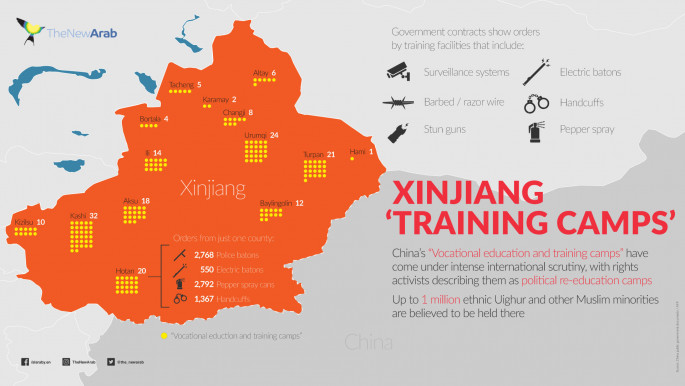
Why the Uighur genocide in China matters
Comment: Given China's increasing power, the international community must act now to ensure that a Uighur genocide does not become become a pivotal event of the century, writes Azeem Ibrahim.
5 min read
'We must preserve the dignity of human life' writes Azeem Ibrahim [Getty]
News on China in recent weeks has been dominated by the findings of the independent report from the Newlines Institute in cooperation with Raoul Wallenberg Centre, which argues that China bears state responsibility for breaching every article of the 1948 Genocide Convention in their treatment of the Uighur people of Xinjiang province.
Parliaments around the world are now studying and debating it, and many are considering following the path set by the Netherlands and Canada in declaring the situation in Xinjiang a genocide. This is as it must be: some 152 counties are signatories to the Genocide Convention (including also China), and each has a duty under the Convention to make their own determination of whether a situation meets the criteria set out in the Convention.
But where the international community ultimately falls on this issue will be a pivotal event in the history of this century. China is currently the second-most powerful country in the world, and its trajectory is still firmly pointed upwards. Sooner or later, China is expected to be able to successfully challenge the US for the top position, if current trends are maintained.
 |
Where the international community ultimately falls on this issue will be a pivotal event in the history of this century |  |
This will have consequences for marginalised groups of people throughout China's immediate regional neighbourhood, but also anywhere in China's sphere of influence. There will never be any justice for the Rohingya people of Myanmar, as Myanmar is quite firmly in Beijing's sphere of influence, for example.
Moreover, as Chinese influence continues to spread in western Asia and in Africa, already present ethnic tensions and rivalries in these regions will be given permission to grow into full-blown ethnic warfare and even more genocides. And let us not even contemplate what the increasing influence of China in the Balkans might give nationalists in power there permission to do.
Alternatively, if the international community responds robustly to the Uighur genocide, this may be the moment when China's global ascendency is stopped in its tracks.
 |
|
| [Click to enlarge] |
Countries dedicated to the values of human rights and international law - mostly western countries and their traditional allies - could start to withdraw from commercial arrangements with Beijing which make them economically dependent on the Asian giant. In that scenario, they could start to reform as a new "Free World", reminiscent of the Cold War, and once again dominated economically by the US, but also underpinned by the US security guarantee.
Neither of these is a good outcome. Twenty years ago when we were first grappling with the rise of China in this century, we all hoped that as it became more integrated with the global economy, Beijing would also pick up some of the values and the liberal political institutions of the West. Had that happened, we would have had a chance to live in a much more harmonious 21st century.
 |
This will have consequences for marginalised groups of people throughout China's immediate regional neighbourhood |  |
As per the Genocide Convention, any state that is party to the Convention is complicit and criminally liable if it continues to engage with a state engaged in genocide. But more than that, every smaller country around the world must now weigh the importance of international law for their own security and the safety of their own people.
The question for every such country for the remainder of this century is this: Is it a good idea to make yourself dependent on a global superpower which only cares for maximising its own power and has no regard for any of your own interests, needs or desires? Or would it be a better idea to join the cause of a global superpower which at least allows itself to be bound by internationally agreed laws and norms?
 |
If China is unwilling to join our system of respect for human life and dignity, we should be unwilling to submit to their vision |  |
The government should now recognise the untenability of developing further economic ties with China, and start building its supply chains and trading relationships with other countries, through an active industrial and trade policy.
We should now also join with other democratic countries to push the IOC to relocate the Olympics from Beijing to another tenable location. Refusing to participate in Beijing's "Games of Shame" will send the clearest signal on the values Global Britain intends to espouse.
And make no mistake, anything less than this and we ourselves will also be complicit in this genocide.
Dr Azeem Ibrahim is a Director at the Newlines Institute in Washington DC and a columnist at Foreign Policy Magazine. He received his PhD from the University of Cambridge after which he completed fellowships at the universities of Oxford, Harvard and Yale.
Follow him on Twitter: @AzeemIbrahim
Have questions or comments? Email us at: editorial-english@alaraby.co.uk
Opinions expressed in this article remain those of the author, and do not necessarily represent those of The New Arab, its editorial board or staff.





 Follow the Middle East's top stories in English at The New Arab on Google News
Follow the Middle East's top stories in English at The New Arab on Google News


